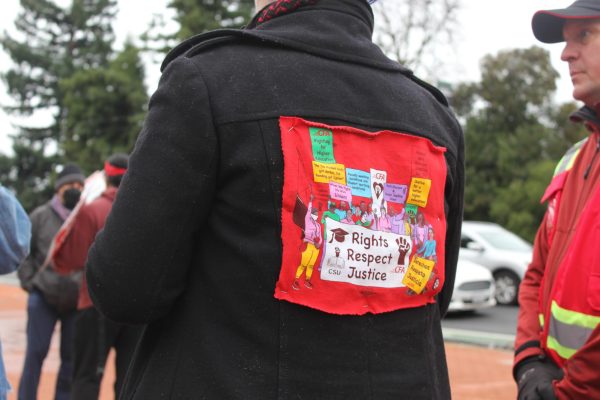The California Faculty Association’s week-long strike ended short on Jan. 22 after being handed a tentative agreement less than 24 hours on the first day of striking.
The California State University and CFA reached an agreement in late January, which provides small pay raises, an increase in parental leave and an extended paid bereavement, but fails to satisfy the original CFA demands.
The faculty vote to authorize the tentative agreement ends Sunday, and if a majority of members vote yes the agreement will be put in place.
Sacramento State CFA President Anne Luna, known for her signature black jean jacket, has been working hard with other union members to voice their concerns.

“This tentative agreement is a step in the right direction,” Luna said.
She highlighted how the tentative agreement addressed the concerns of faculty, but not to the extent the CFA initially fought for.
“Although the TA includes 10 weeks of paid parental leave, this falls short of our goal of a full semester or 16 weeks of paid parental leave,” Luna said.
Previously, faculty received only six weeks of paid parental leave, but the slight increase in the tentative agreement is considered a small win by Luna.
“We are dedicated to continuing that fight in the next round of collective bargaining,” Luna said.
RELATED: Sac State staff and students discuss opinions on CFA tentative agreement
Coined as social justice unionism, the tentative agreement addressed concerns from faculty of color, parents who are faculty and faculty who are paid at the lowest level.
Melissa Cardenas-Dow, Sac State representative for the racial and social justice council in CFA, said the tentative agreement achieves small steps toward the union’s anti-racism and social justice goals.
“The one big step I want to highlight is the extension of what we know of as the Weingarten rights,” Cardenas-Dow said. “Members have a representative with them whenever they have some sort of interaction with campus police.”
Cardenas-Dow said some faculty of color have experienced negative interactions with campus police in the past, and the agreement attempts to protect faculty who feel unsafe.
To align with Weingarten rights, the agreement proposes that a chosen representative will be provided to faculty when interacting with campus police, and if a union representative cannot be there, an attorney may be present.
“If we think about this as kind of a chapter of an ongoing story, then it doesn’t feel so bad,” Cardenas-Dow said.
RELATED: ‘Stop being afraid’: Black faculty urge Sac State to call out campus racism
Some faculty see this agreement as a building block for the union’s future bargaining sessions with the CSU.
Cardenas-Dow wants CFA members to know that this agreement is by no means the end of their story, but rather the next step in creating better working conditions for all.
“We get another chance, and I think that’s the most important part that I hope other faculty realize. This isn’t the end of the story,” Cardenas-Dow said.
CFA treasurer for Sac State Monicka Tutschka believes social justice issues are the same as working conditions for the union.
The tentative agreement fails to provide more gender-inclusive restrooms and lactation spaces for faculty. Instead, the CSU system will provide updated information about the already available facilities.
If faculty have inadequate access to gender-inclusive restrooms, CFA must notify human resources on campus within 60 days.
“We do have transgender students, faculty and staff on this campus, and when I hear that there’s no unisex bathroom for them and they have to walk 10 minutes,” Tutschka said. “It’s not just part of the culture wars, but this is a real working condition.”
According to the tentative agreement, once a CFA member files a grievance, the CSU must address it by adding more options or explaining why it’s not feasible.
“We’ll build the union’s strength moving forward and really get to know what people need,” Tutschka said. “What are the real needs, and not only the needs of the person who’s the loudest in the room?”



































































































































